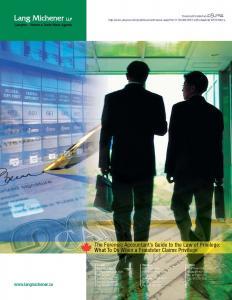Jennifer Fiddian-Green
Pardon me, but is that clean or dirty money?
A key question once Canada’s new legislation comes into effect.
The deal is almost closed, so far everything has gone as planned and this will be a great account to add to your list. All you need to do is take receipt of the funds and invest as planned with your client. Your new client provides funds with two cheques from different third parties, unusual but once the funds clear, you are ready to move ahead. One month later after payment of penalties for early redemption, this client has cashed out and your organization has provided a cheque. A clean cheque. What are the chances that your organization was used to launder funds? Continue reading The New Proceeds of Crime (Money Laundering) Act: Bill C-22

